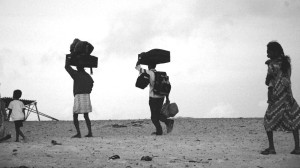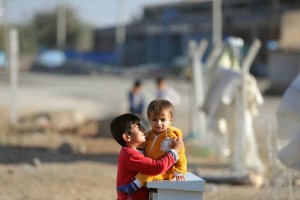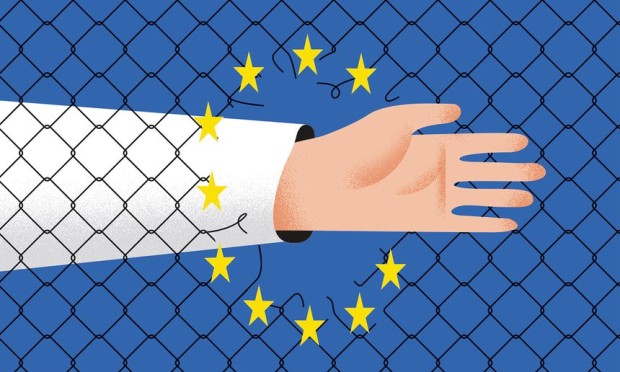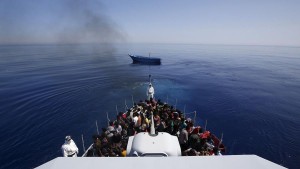This article reflects on the crisis of values Europe is currently going through. Its best example is the rejection and indifference that the refugee crisis has generated among the European political elites. As the refugee’s migratory flow intensifies, and more and more people die in the Mediterranean, Europe adopts a more passive attitude towards the problem. Thus, as Natalie Nougayrède, author of the article, states: “Europe isn’t confronted with a refugee and migrant crisis. It’s the refugees and migrants who are confronted with a crisis of Europe.”
Immigration is likely to remain an overarching theme in European politics. And for a long time yet. It was at the heart of the UK referendum campaign (although this concerned mostly intra-EU migration), and it is set to dominate French and German elections next year (focusing on immigration from outside Europe). In the summer of 2015 Angela Merkel predicted that migration and asylum would “in the future preoccupy” Europe “much, much more” than financial issues have done. One year on, there is little reason to dispute this.
A record 3,800 people have perished in the Mediterranean since the beginning of this year, according to the United Nations. Europe may have closed off the Aegean and Balkan routes, but more people are drowning than ever before in the central Mediterranean desperately trying to reach Italy.
A hard impact on European politics
The migration issue has shaped political discourse in Europe, and is likely to continue to shape it. On one side are liberal internationalists attached to fundamental asylum principles or to the dream of a borderless world; on the other are xenophobic fence-builders who see migration as a modern version of barbaric invasions threatening culture and civilisation. The latter, alas, tend to hold sway.
 One of the collateral damages of post-truth politics is that not only the present gets distorted – the past gets rewritten as well. Racist videos online depict fantasies of Europe “before” and “after” migration. “Before” is depicted with orderly scenes of 1950s streets, shops and parks where an all-white population strolls or plays happily. “After” is groups of dark-faced men attacking women, rioting against the police, shouting “Allahu Akbar”.
One of the collateral damages of post-truth politics is that not only the present gets distorted – the past gets rewritten as well. Racist videos online depict fantasies of Europe “before” and “after” migration. “Before” is depicted with orderly scenes of 1950s streets, shops and parks where an all-white population strolls or plays happily. “After” is groups of dark-faced men attacking women, rioting against the police, shouting “Allahu Akbar”.
The essential narrative of bigots is that our European world is collapsing under the onslaught of mass arrivals from cultures that we cannot possibly mingle with. In France, a theory called the “great replacement” has spread to large parts of the right and certainly the far-right. It states that, as a result of immigration, the nation’s core population is set to be replaced by non-European outsiders who will wreck the country’s identity. There are also echoes of this in Germany’s Pegida movement, whose full name is “Patriotic Europeans against the Islamisation of the west”.
The essential narrative of bigots is that our European world is collapsing under the onslaught of mass arrivals from cultures that we cannot possibly mingle with
Debunking these myths can be hard work. Hatred and passions overtake rational approaches and documented facts get swept away. It is even harder when Europe’s long history of almost constant population movement and mixing of cultures is ignored, untaught or forgotten. For example, it’s often said that the arrival of Arabs and Muslims in France started when post-second world war reconstruction efforts required a new labour force, or after Algeria became independent in 1962. Yet Algerians (especially from Kabylie) have been in France for at least a century. The French historian Benjamin Stora says the real challenge of immigration is “the challenge of knowing the other” – and it goes both ways.
The 2015 refugee crisis has held up a mirror to Europeans: it’s forced them to ask themselves who they are, how they define themselves and their actions. The 1.3 million people who reached the continent last year represented only 0.2% of the EU’s total population. It should have been manageable. Germany alone took in roughly 800,000. That’s equivalent to 1% of its own population, and is the same number it absorbed in 1992 when people fled the Balkan wars and ethnic Germans left the former Soviet Union.
A crisis of values
If there was a crisis in 2015, it had less to do with the refugees – who knew what they were fleeing and where they wanted to go – and much more to do more with European governments and societies who did not all step up to the plate. In fact, Europe isn’t confronted with a refugee and migrant crisis. It’s the refugees and migrants who are confronted with a crisis of Europe. The scandal is that, in the Mediterranean, they have been paying with their lives.
Europe needs immigration as an injection of youth and dynamism if in the decades to come it wants to address its workforce and pension problems
Demographers point out that the pivotal migration year for Europe was 2014. That’s when Europe for the first time surpassed the US as a destination for immigrants, according to the French demographer François Héran. Around 1.9 million legal immigrants came to the EU (population 508 million) and 1 million to the US (population 319 million). With that, the European ratio became 3.7 legal immigrants per 1,000 inhabitants, while the US’s was 3.1. This is the new, transformative reality many Europeans have yet to acknowledge.
Historically, Europe exported its population, whether to distant colonial possessions for conquest and domination, or to the New World as a consequence of poverty, persecution or war. Now, it has become the foremost magnet and refuge for those who seek safety and a better life. We are simply much richer and more stable than many other parts of the world.
 And our diversity is set to grow, but not in the “great replacement” scenario. Europe needs immigration as an injection of youth and dynamism if in the decades to come it wants to address its workforce and pension problems.
And our diversity is set to grow, but not in the “great replacement” scenario. Europe needs immigration as an injection of youth and dynamism if in the decades to come it wants to address its workforce and pension problems.
Europeans were once the huddled masses on boats reaching Ellis Island, in New York, or Pier 21 in Halifax, Canada’s gateway for immigrants – both now museums. I visited Pier 21 a few years ago, and spent some time looking at pictures of Hungarian refugees who had fled the repression of the 1956 Budapest uprising and celebrated their arrival. Perhaps Viktor Orbán, Hungary’s self-avowedly “illiberal” prime minister, who shuns refugees, should take a look. Perhaps other European politicians should too.
Canada and the US are countries whose creation derived from the movement of people to faraway shores; European nations are rooted otherwise. But Europe could draw inspiration from the capacity to form a positive narrative that embraces migration instead of treating it mainly as a threat. Europe, as the new continent of immigration, will increasingly need that narrative.
Source: The Guardian
















No Comments